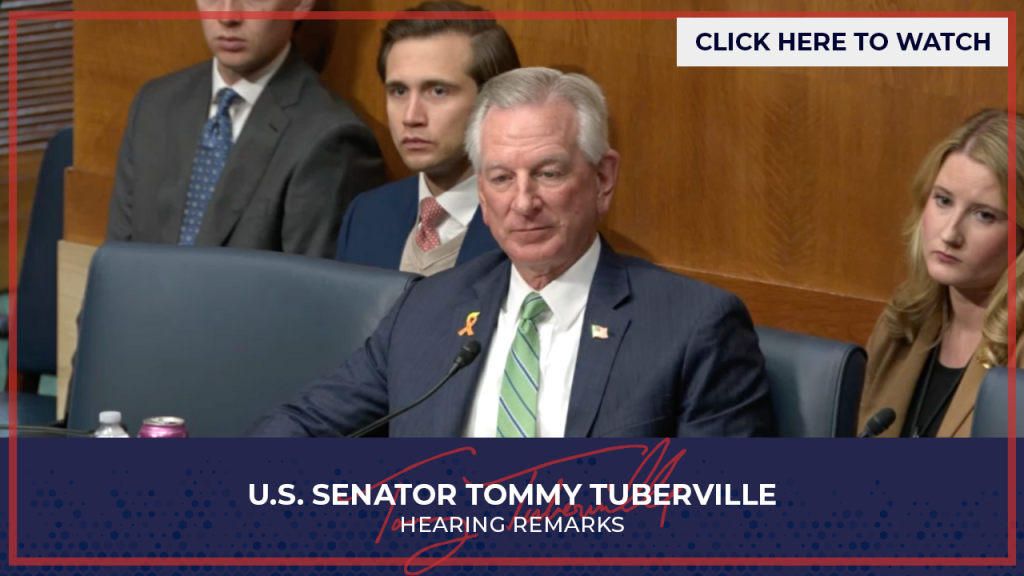WASHINGTON – Today, U.S. Senator Tommy Tuberville (R-AL) spoke with Lowell Schiller, Nonresident Senior Scholar at the USC Schaeffer Institute, John Crowley, President and CEO of Biotechnology Innovation Organization, and Josh Makower, Yock Family Professor of Medicine and of Bioengineering at Stanford University, during a Senate Health, Education, Labor, and Pensions (HELP) Committee hearing about the future of biotech.
Read Sen. Tuberville’s remarks below or on YouTube or Rumble.

TUBERVILLE: “Good morning. Mr. Schiller, following President Trump’s Domestic Manufacturing Executive Order that FDA launched—the pre-check program to support U.S. drug manufacturing—the program offers more frequent communication at key development stages and simplifies some manufacturing information required in applications. How can the FDA use pre-check to improve inspections, encourage more domestic pharmaceutical manufacturing?”
SCHILLER: “Thank you for the question, Coach. The program has a lot of potential. Some of the challenges around investment in domestic manufacturing goes to a degree of uncertainty about how FDA’s regulations will apply to those facilities. And so having earlier more frequent interactions with the agency through that process can help enormously. There’s other things that the Agency can be doing as well, things like updating manufacturing regulations to accommodate more advanced manufacturing techniques. The regulations were written for conventional older techniques, so updating them to take into account use of AI, use of continuous manufacturing would be incredibly helpful.”
TUBERVILLE: “Thank you. Mr. Crowley, [the] Hudson Alpha Institute in Biotechnology in my state of Huntsville is a global leader in genomics. In precision medicine in 2008, it had generated over $3.5 billion economic impact in my state, 45 companies it supports, 2,000 high-paying jobs has attracted more than $300 million in competitive research funding. Hudson Alpha acts as an incubator for biotechnology research and development that helps researchers move their ideas from lab to product development. NASA has been involved in space genomics. It’s helped with cancer and heart disease risks. What are the institutes like Hudson Alpha doing right and how can we continue to encourage more similar efforts?”
CROWLEY: “Senator, Coach, thank you for the question. You bring up a very important point and this is how medicines are made. If you look last year, nearly three quarters of all medicines approved by the FDA came [and] originated from startup biotech companies. Over time, well, more than half of all medicines come from these small businesses, these incubators of research. When we look at what it takes to make newer and better medicines, it’s an entire ecosystem. It’s what we call this virtuous circle of innovation grounded in our great academic universities or institutions like in Alabama, oftentimes funded and partnered with the important research that goes on at the National Institutes of Health. And that foundational research is what oftentimes spurs our startup companies. And so many times over and over again, it’s a great technology, a disease where there’s an unmet need. There are entrepreneurs, people giving angel money investments, startup capital. There are economic development funds in many of our states, such as in Alabama, to support these startup companies. And also too, having these clusters in so many—and really in each of your states—where innovators, entrepreneurs can come together, where there’s lab space provided, where they’re in proximity to academic research. Oftentimes, our startup companies, the founders—scientific founders—have joint appointments at local universities, state universities, and our startup companies. This is what’s so uniquely American. Biotechnology is only a 49-year-old industry. Our very first company, Genentech, was founded by a scientist at the University of California, San Francisco, and a venture capitalist as well. This happens in every state. It happens in Alabama. And as you go along that virtuous circle of innovation, it takes this community to small companies, it takes our contract research organizations, our contract manufacturers, providers of capital, oftentimes Wall Street ultimately driving private capital to these incredibly risky, incredibly expensive, and incredibly important ventures. So again, I commend the state of Alabama and what they’re doing to promote research, science, and development. This is the heart and soul of biotechnology, and it’s what we need to strengthen and continue.”
TUBERVILLE: “Thank you. Mr. Makower, we talked a lot about the United States’ history of [being a] global leader in biotechnology. We held that title for decades and we want to keep it for generations to come. Could you explain how America built and sustained this dominance? And what targeted strategies we can pursue to maintain it?”
MAKOWER: “Absolutely. Thank you for the question, Senator. Most importantly, we need to remove unnecessary delays. Efficiency through the process is absolutely key as most of these innovations are coming as John Crowley mentioned from small companies. Small companies that rely on venture capital and a very short timeline to be able to achieve their goals. So, by improving the process and shortening it, allowing it still to be as rigorous, but removing inefficiencies, that’s one of the primary ways we can do that.”
TUBERVILLE: “Thank you. Thank you, Mr. Chairman.”
Senator Tommy Tuberville represents Alabama in the United States Senate and is a member of the Senate Armed Services, Agriculture, Veterans’ Affairs, HELP and Aging Committees.
###